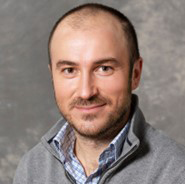



I am Research Director of the French research organisation CNRS (Centre national de la recherche scientifique), deputy director of a 110-members research team working on the neuromuscular system lead by Prof F. Relaix, and leader of a group working on muscle stem cells-niche interactions, situated at the Mondor research Institute, Paris-East University, France.
I have a long-standing interest in Notch signalling and the regulation of stem cell quiescence. We are using the murine skeletal muscle as a model system and our experimental approach is based on high-throughput techniques coupled with mouse genetics to identify and study novel regulators of muscle stem cell establishment and maintenance. I conducted my PhD in the laboratory of Prof Artavanis-Tsakonas at the Harvard Medical School, a leading team in the field since Prof Artavanis cloned the Notch locus. My introduction to the field of muscle research was done during my postdoctoral fellowship at the Pasteur Institute, Paris, and later at the Institute of Myology also in Paris.
My research is addressing fundamental aspects of muscle stem cell biology. I am a strong advocate for basic research that I consider the essential core of discoveries from which biomedical knowledge and therapies can stem. In addition, I am committed to teaching and mentoring trainees at all levels, including graduate and medical students.
I firmly support collaborative research for exchanging and generating ideas, learning new skills, and higher quality results. For this, I have been actively involved in the organisation of international meetings in my two main fields of expertise: muscle biology and Notch signalling.
Dr. Dada Pisconti earned her PhD from the University of Bari School of Medicine and undergraduate degrees from the University of Perugia. She is currently an Associate Professor in the Department of Biochemistry and Cell Biology at SUNY Stony Brook, New York, where she moved in late 2018 from the University of Liverpool, UK. Her research aims to understand how muscle stem cells interact with their microenvironment, also known as niche, and how niche remodeling during growth and regeneration is mechanistically linked to stem cell fate decisions, homeostasis and regenerative potential. The Pisconti lab also studies the molecular pathogenesis of Duchenne muscular dystrophy and Myalgic Encephalomyelitis/ Chronic Fatigue Syndrome. More recently the lab has started a collaboration with colleagues at Nofima in Oslo, Norway, to study the chicken myopathy commonly known as wooden breast, which afflicts a significant fraction of fast-growing broilers. Together with long-term collaborator Dr. Hugo Olguin, at the PUC in Santiago, Chile, the Dr. Pisconti studies the mechanisms that regulate the choice between differentiation and quiescence in muscle stem cells, as well as the mechanisms that maintain quiescence.
Prof. Shahragim Tajbakhsh obtained a Ph.D. in Biology, Carleton U., Canada on molecular biology of viruses. Following postdoctoral research at Institut Pasteur he established an independent group in 2001 called "Stem Cells & Development" to study how stem cells establish and regenerate organs and tissues, with a focus on skeletal muscle. The aim of his laboratory is to investigate stem cell properties during development and postnatally to understand how skeletal muscle is established, and how it regenerates during disease, and after injury. Areas of focus include quiescence, niche, self-renewal, symmetric/asymmetric cell divisions, regeneration and ageing. His lab used mouse genetics to show that muscle stem cell populations are remarkably diverse in function leading to the hypothesis that the modular design in the embryo might in part be responsible for the mosaic response in pathology of muscles in myopathies.
ST is an EMBO member, former Head of Dept. of Developmental & Stem Cell Biology, and co-Director of "Laboratory of Excellence" Consortium, REVIVE (28 labs working on stem cells; 2011-2024). He is member of different scientific councils (e.g., French myopathy organisation, vice-President), several SABs and presides on editorial boards of 4 scientific journals. He has participated in several EU consortia (FP6, EuroStemCell; FP7, EuroSyStem, Optistem, NotchIT) and received several awards including Chair of Excellence Louis Pasteur (Institut Pasteur, 2017) and the French Academy of Sciences. He received numerous competitive grants (e.g., EU, ANR, FRM, ARC, 2-time awardee of ERC Advanced Grant). In 2010, 2015, and 2020 the national HCERES ranked the ST laboratory as A+, outstanding.

Prof. Tedesco is a clinician-scientist with expertise in paediatric neuromuscular diseases and muscle regeneration. He graduated in Medicine and Surgery with honours at the Sapienza University of Rome (Italy). Before his doctorate he was a visiting scientist at the Institut Pasteur (Paris, France) studying muscle stem cell biology. He obtained his PhD investigating novel gene and cell therapies for muscular dystrophy at the San Raffaele Scientific Institute of Milan (Italy). Prof. Tedesco received the 2015 Young Investigator Award by the European Society of Gene and Cell Therapy. He was then awarded an NIHR Academic Clinical Fellowship, followed by a Clinical Lectureship in Paediatric Neurology, and a prestigious European Research Council (ERC) Starting Grant. He received the 2020 Simon Newell Investigator of the Year award by the Royal College of Paediatrics and Child Health and the 2021 MacKeith Prize by the British Paediatric Neurology Association.
The Tedesco laboratory studies skeletal muscle regeneration, focusing on the development of novel therapies for incurable neuromuscular disorders of childhood. They work pioneered the use of cutting-edge technologies such as human induced pluripotent stem (iPS) cells, artificial chromosomes and tissue engineering for advanced disease modelling and gene/cell therapies of muscle diseases. Current projects investigate iPS cell-derived myogenesis for complex neuromuscular disease and therapy modelling, as well as the use of small molecules to improve myogenic cell delivery. The overall goal of the Tedesco laboratory is the translation of the aforementioned regenerative strategies into novel therapies to improve outcomes for children with neuromuscular disorders.